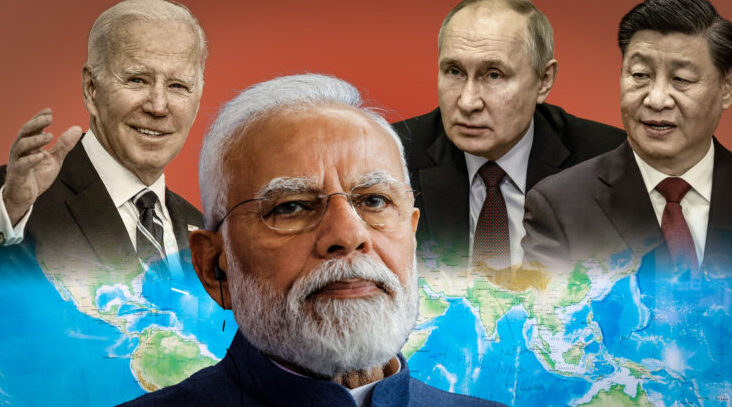Navigating a Multipolar World (GS Paper 2, Polity)

Introduction:
- The incumbent BJP is running a coalition government after a decade.
- On foreign policy fronts, the coalition government has shown continuity by placing S. Jaishankar as the Foreign Minister.
- This tenure of Jaishankar will see some continuity and some shifts in foreign policy formulations.
S. Jaishankar Articulated India’s Viewpoint on the Global Front:
- At the Bratislava Forum in June 2022, Jaishankar shifted the political narrative on India by reminding the world that “Europe has to grow out of the mindset that Europe’s problems are the world’s problems but the world’s problems are not Europe’s problems.”
- This statement resonated widely, particularly in the Global South, and even in Europe, where German Chancellor Olaf Scholz acknowledged Jaishankar's point at the Munich Security Conference a year later.
- India’s goodwill, built over decades as a neutral and non-aggressive power, has served the country well despite major geopolitical changes.
- However, for the next five years, India will need a differentiated narrative — one based on its 8.2 percent GDP growth, entry into global trade regimes, and the digital model.
Continuities and Shifts in Foreign Policy:
The Continuities in Foreign Policy:
1. Greater Integration and Cohesion in the Subcontinent:
- This was evident at the inauguration of the new government, attended by India’s neighbors — Bangladesh, Bhutan, Nepal, Maldives, Sri Lanka, along with Indian Ocean partners Mauritius and Seychelles.
- All of South Asia, except Pakistan, was present, indicating that greater economic integration and geopolitical cohesion in the Subcontinent are on the agenda.
2. India Will Remain a Voice for the Global South:
- During India’s G20 presidency in 2023, the inclusion of the African Union into the G20 highlighted the focus on the Global South.
- Additionally, PM Modi inaugurated the (Dakshin) Development and Knowledge Sharing Initiative Global South Centre for Excellence, aimed at knowledge-sharing for locally relevant solutions and capacity-building.
- More such initiatives are expected in the future.
3. Cordial Relations with Great Powers:
- India has built strong relationships with the great powers, especially the US, maintaining a 2+2 ministerial dialogue (foreign and defense ministries) with both the US and Russia.
- India is part of more multilateral groupings than ever before, such as the G20, Quad, SCO, BRICS, I2U2, and the Indo-Pacific Economic Framework.
- New Delhi has managed its friendship with Moscow well, continuing political engagement and imports of oil and defense equipment.
- Despite tensions with China, India has maintained peace, setting an example for other great powers.
- India is also close to other G7 countries and has been a permanent invitee to G7 summits since 2019.
- While stepping into trade regimes with the great powers is still a work in progress, India has made significant strides with middle powers like Australia, the UAE, and the four non-EU EFTA countries.
The Shifts in Foreign Policy:
1. A Shift from Geo-Politics to Geo-Economics:
- India’s global conversation must transition from political to economic discourse.
- Delhi has committed to investors that India can be a trusted +1 alternative to China.
- There will be greater efforts on the Make in India initiative, expansion of supply chains, and infrastructure development.
- Corporate India will be encouraged to increase investments in manufacturing, and India will position itself as a services exporter beyond IT services.
- The Global South, rich in human capital, will follow India’s example.
- The Telugu Desam Party, a new coalition partner, is completing the building of Amaravati, aiming for a modern capital competitive on the tech front domestically and internationally.
- India’s digital public infrastructure model is already accepted and promoted in both developed and developing countries.
2. More Coordination Among Middle Powers:
- The past five years have seen global instability due to COVID-19, the Russia-Ukraine war, the Gaza conflict, and sanctions imposed by great powers.
- Middle powers — countries with significant economic, regional, and military influence — are beginning to assert themselves.
- Countries like Australia, South Korea, Saudi Arabia, Turkey, Singapore, and Germany are emerging as influential players.
- India fits in with this group, along with Brazil, South Africa, Mexico, and Indonesia, and will increase its engagement with these peer nations.
Conclusion:
- India is an important participant in several groupings, both old and new. Its goal is economic and financial progress, and just global governance, reflecting the emerging multipolar world order.
- By maintaining its central role, India helps to keep the world steady amid ongoing global shifts, neither succumbing to the "exorbitant privilege" of dollar domination nor the reserve-currency obsession of the Yuan.


